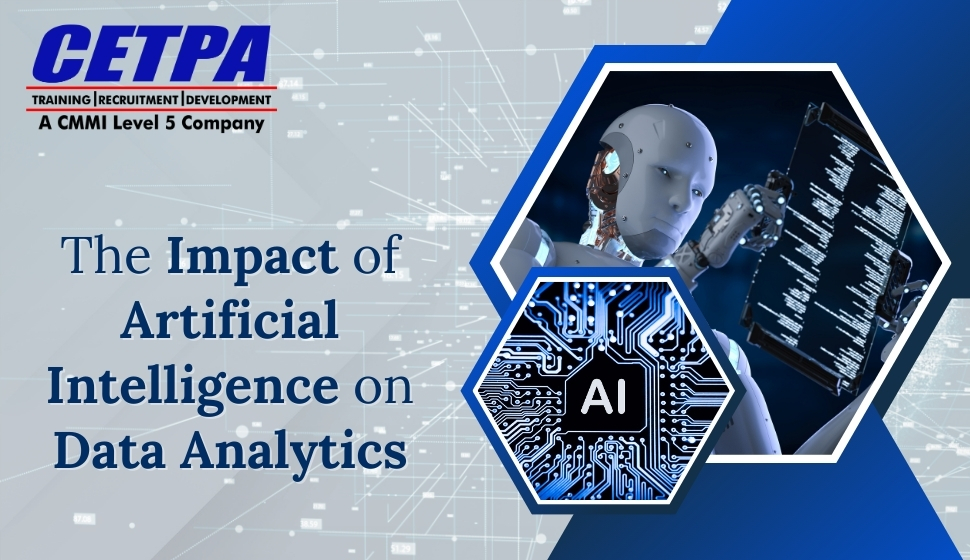Data – it’s the lifeblood of modern businesses, a seemingly endless sea of information waiting to be unlocked. But with data volumes growing at an unprecedented rate, traditional analytics methods are struggling to keep pace. Enter Artificial Intelligence, a game-changer expected to transform the way we extract insights and make data-driven decisions. The following blog delves deep into the revolutionary impact of AI on data analytics, navigating through its capabilities and the intriguing opportunities it holds for the future.
From Manual Labour to Machine Intelligence: The Limitations of Traditional Analytics
Data analysis was heavily dependent on manual processes and statistical techniques for decades. According to a popular data analytics training in Delhi, data scientists spend countless hours cleaning, organizing, and manipulating data, often resulting in lengthy cycles and limited insights. Here’s where traditional analytics falls short:
- Scalability Challenges: The large volumes of data generated in present times can overwhelm traditional methods. Businesses struggle to evaluate massive datasets efficiently, leaving valuable insights buried.
- Human Bias and Limitations: Human analysts are prone to unconscious prejudice and cognitive limits. They may overlook minor patterns or struggle to recognise complicated links among vast datasets.
- Limited Predictive Power: Traditional methods often concentrate on historical trends, providing limited predictive potential. Businesses require real-time insights to predict future trends and make proactive decisions.
How Artificial Intelligence Empowers Data Analytics?
As per most data analytics training programs, AI injects a dose of intelligence into data analysis, automating tasks and revealing hidden patterns at an unprecedented rate. The following are some ways in which AI is revolutionizing the data analytics ecosystem:
- Automating Data Preparation: AI algorithms automate difficult tasks such as data cleansing, normalization, and transformation. This frees up data scientists to concentrate on higher-level analysis and strategic interpretation.
- Pattern Recognition and Anomaly Detection: According to a renowned artificial intelligence course, AI masters at determining complex patterns and anomalies within large datasets. It can identify subtle variations and correlations that might get missed by human analysts, resulting in breakthrough discoveries.
- Predictive Analytics and Machine Learning: AI-powered algorithms learn from historical information and can forecast future trends with remarkable accuracy. Organizations may use these insights to optimize operations, predict customer behavior, and make data-driven decisions with greater accuracy and confidence.
- Natural Language Processing: According to top-rated data analytics training programs, AI has the ability to assess large amounts of textual data, including social media sentiment, customer reviews, and market research reports. Further, as per data analytics summer training program, this equips businesses to extract valuable insights from previously untapped sources.
- Real-Time Analytics and Business Intelligence: AI allows for real-time analysis of data streams, permitting businesses to monitor performance, determine challenges, and make adjustments on the fly. This results in faster response times and a competitive advantage.
Unveiling The Broader Impact of AI in Data Analytics
As per a reputed data analytics online course, the impact of AI on data analytics expands far beyond enhanced efficiency and automation. It unlocks a new level of understanding and promotes a more proactive approach to data-driven decision making. Some of the aspects that demonstrate the broader impact of AI in data analytics include:
- Democratization of Data Analysis:AI-powered tools are becoming much more user-friendly, making data analysis accessible to a broad range of employees within an organization. This equips individuals across departments to use data insights in their roles.
- Hyper-Personalization: AI can evaluate customer data to build personalized experiences and targeted marketing campaigns. Organizations can cater to specific customer needs and preferences, boosting engagement and loyalty.
- Innovation and New Business Models: Ai-powered data analysis can unleash hidden prospects and inform the development of innovative products and services. Organizations can use this knowledge to stay ahead of the curve and disrupt their industries.
The Future of Data Analytics: A Harmonious Relationship Between Humans and Machines
While AI is transforming data analytics, it’s essential to remember it’s not a replacement for human expertise. The future remains in a collaborative approach where humans and machines work together. Come, let’s explore!
- Human + Machine Intelligence: Data scientists will use AI tools to augment their analysis capabilities, focusing on activities that require critical thinking, creativity, and field expertise.
- Explainable AI: As AI models become more complex, developing interpretable AI is essential. This permits humans to understand the reasoning behind AI-generated insights, promoting trust and confidence in data-driven decisions.
- Ethical Considerations: As AI in data analytics becomes more pervasive, ethical considerations come to the forefront. Businesses require to ensure data privacy, eliminate bias, and leverage AI judiciously for the benefit of all stakeholders.
Conclusion:
The emergence of AI heralds a new age in data analysis. Businesses that embrace AI technologies and cultivate a culture of data-driven decision-making may unleash the actual potential of their data, earning a competitive advantage and driving themselves towards a future powered by intelligent insights. As the phrase goes, “knowledge is power,” and with AI-powered data analytics, that power is more accessible than ever. Are you ready to use AI to revolutionize your business via data? Join the best data analytics training today and take the next step towards a successful career!










